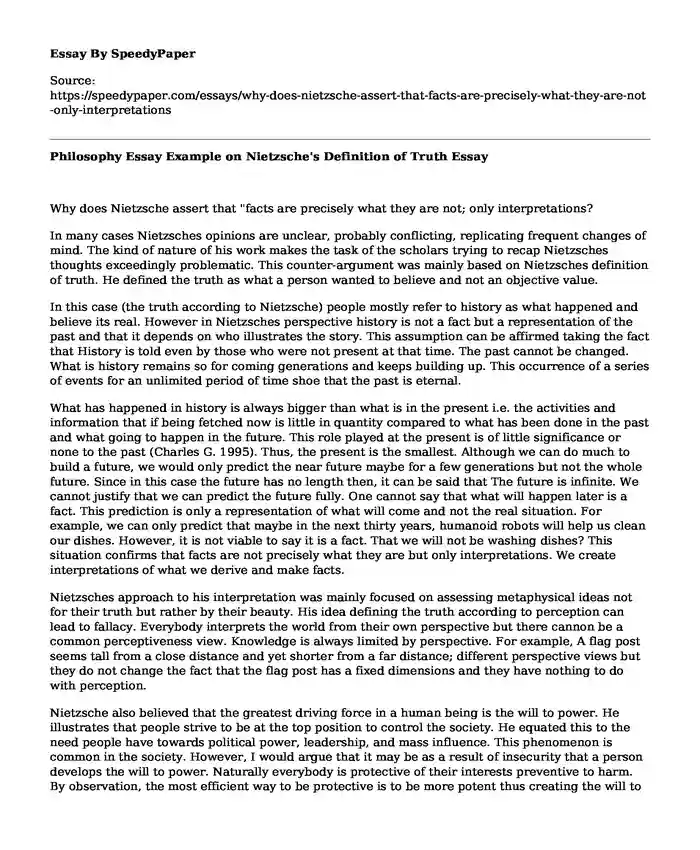
| Type of paper: | Essay |
| Categories: | Philosophy Nietzsche |
| Pages: | 3 |
| Wordcount: | 702 words |
Why does Nietzsche assert that "facts are precisely what they are not; only interpretations?
In many cases Nietzsches opinions are unclear, probably conflicting, replicating frequent changes of mind. The kind of nature of his work makes the task of the scholars trying to recap Nietzsches thoughts exceedingly problematic. This counter-argument was mainly based on Nietzsches definition of truth. He defined the truth as what a person wanted to believe and not an objective value.
In this case (the truth according to Nietzsche) people mostly refer to history as what happened and believe its real. However in Nietzsches perspective history is not a fact but a representation of the past and that it depends on who illustrates the story. This assumption can be affirmed taking the fact that History is told even by those who were not present at that time. The past cannot be changed. What is history remains so for coming generations and keeps building up. This occurrence of a series of events for an unlimited period of time shoe that the past is eternal.
What has happened in history is always bigger than what is in the present i.e. the activities and information that if being fetched now is little in quantity compared to what has been done in the past and what going to happen in the future. This role played at the present is of little significance or none to the past (Charles G. 1995). Thus, the present is the smallest. Although we can do much to build a future, we would only predict the near future maybe for a few generations but not the whole future. Since in this case the future has no length then, it can be said that The future is infinite. We cannot justify that we can predict the future fully. One cannot say that what will happen later is a fact. This prediction is only a representation of what will come and not the real situation. For example, we can only predict that maybe in the next thirty years, humanoid robots will help us clean our dishes. However, it is not viable to say it is a fact. That we will not be washing dishes? This situation confirms that facts are not precisely what they are but only interpretations. We create interpretations of what we derive and make facts.
Nietzsches approach to his interpretation was mainly focused on assessing metaphysical ideas not for their truth but rather by their beauty. His idea defining the truth according to perception can lead to fallacy. Everybody interprets the world from their own perspective but there cannon be a common perceptiveness view. Knowledge is always limited by perspective. For example, A flag post seems tall from a close distance and yet shorter from a far distance; different perspective views but they do not change the fact that the flag post has a fixed dimensions and they have nothing to do with perception.
Nietzsche also believed that the greatest driving force in a human being is the will to power. He illustrates that people strive to be at the top position to control the society. He equated this to the need people have towards political power, leadership, and mass influence. This phenomenon is common in the society. However, I would argue that it may be as a result of insecurity that a person develops the will to power. Naturally everybody is protective of their interests preventive to harm. By observation, the most efficient way to be protective is to be more potent thus creating the will to power.
Conclusion
Nietzsches definition of truth is the basis of his argument Facts are precisely what they are not; only interpretations. However, if this statement if true then it is a fact it self which is a contradictiion. In this case it seems Nietzsche would not have cared. It is suggestive to say that the particulars of logical breakdown barely had any attention or appeal for him at all. If one can argue with Nietzsches statement convincingly then they should not have problems with awkward issues like factual accuracy which makes them as imprecise as possible.
References
Charles Guigon & Derk Pereboom (1995). Existentialism: Basic Reading Indianapolis, IN: Hackett.
Cite this page
Philosophy Essay Example on Nietzsche's Definition of Truth. (2017, Sep 07). Retrieved from https://speedypaper.com/essays/why-does-nietzsche-assert-that-facts-are-precisely-what-they-are-not-only-interpretations
Request Removal
If you are the original author of this essay and no longer wish to have it published on the SpeedyPaper website, please click below to request its removal:
- Personal Experience Essay: Never Forget Your Childhood Dreams
- Elements toward Building an Argumentation Essay Example
- Food Quality and Safety, Free Essay Sample for Everyone
- Free Essay Sample: Organic vs. Non-Organic
- Free Essay Sample on Social Media Enhance Political Campaigns
- Paper Example on the Pneumococcal Vaccine
- Free Essay: Policy Analysis on Social Security
Popular categories




